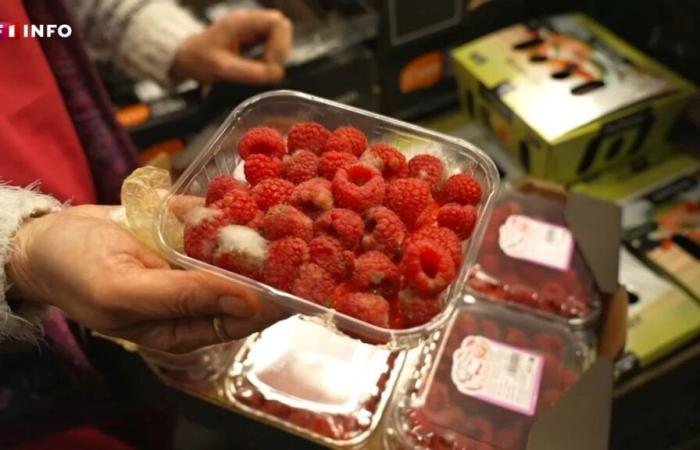Since 2016, supermarkets have been required to donate their unsold goods to associations.
But these food donations decline in quality or expire very quickly.
Watch this report from TF1.
Follow the full coverage
The 1 p.m.
Moldy or crushed fruit, used tissues in the crates… for Béatrice Gaudard, volunteer with a food aid association in Isère, donations from nearby supermarkets are sometimes real poisoned gifts. In recent years, his association has noticed that the quality of the food donated has deteriorated significantly.
“Look, she says, pointing to a tray of raspberries where several fruits are already visibly eaten by mold. Can we make jams with this? I don't think so. That goes in the trash.” In some pallets, she even found the employees' plastic gloves. “There are coffees too, cups, masks… There must be a minimum of respect for us anyway. We are not trash!”insists the volunteer.
Additional costs for associations
Same feeling among the volunteers of the Rhône Food Bank. In the hangar where fresh products from supermarkets are received, products whose expiry date is scheduled for the same day are multiplying. If this is legal, it is a real headache for the association, forced to redistribute the food urgently, at the risk of throwing it away. “I throw away two tonnes of products per week which are due to this type of product and I pay the service provider who takes care of this waste. These are additional costs for us. Association, I remind you”recalls Alice Dehan, director of this local Food Bank.
Conversely, for supermarkets, these donations allow them to incur fewer trash costs. Fewer employees are paid to sort, and as a bonus, donations are tax-free. “So the idea may be for certain operators to record this on the right side of the tax balance by saying 'I am making a donation', rather than putting it on the wrong accounting side by saying 'I have waste, therefore a loss' “points out Mathias Tinchant, deputy director of the departmental directorate for the protection of populations in the Rhône. To avoid these situations, state services regularly carry out checks in large stores.
-
Read also
Six Food Bank trucks burned in Nîmes: what the video surveillance images show
For their part, supermarkets recognize that donations to associations have decreased. This is particularly due to the anti-waste bins set up in stores, in which products about to expire are offered on sale. “The priority, unfortunately, today is for customers. Today, consumers favor this type of product”underlines Nicolas Vigié, food sales manager in a store.
Since 2016, various laws have successively forced large distributors and then manufacturers to donate their unsold goods rather than destroy them. A way to fight against food waste while Ademe reminds us that each French person continues to throw away 30 kg of food products per year. In 2022, 4 million tonnes of edible food will be thrown away, or almost half of total food waste.






